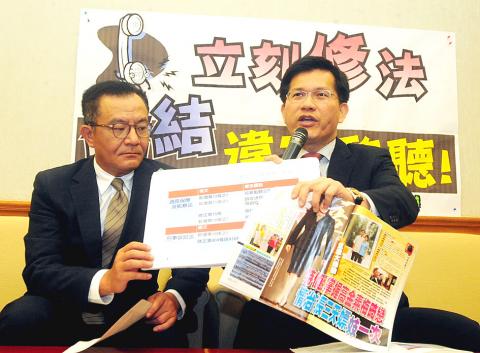|
Lawmakers call for end to improper
wiretapping
By Chris Wang / Staff reporter

Democratic Progressive Party
legislators Lin Chia-lung, right, and Gao Jyh-peng hold a press conference in
Taipei yesterday proposing amendments to curtail wiretapping.
Photo: Wang Yi-sung, Taipei Times
The law must immediately be amended to
stop rampant improper and unconstitutional wiretapping practices, Democratic
Progressive Party (DPP) lawmakers said yesterday, in response to prosecutors’
reported wiretaps on a minister and a lawmaker.
Yesterday’s edition of the Chinese-language Next Magazine reported that the
Special Investigation Division (SID) of the Supreme Prosecutors’ Office had
wiretapped mobile phone conversations between Minister of the Interior Lee Hung-yuan
(李鴻源) — then-deputy commissioner of Taipei County — and Non-Partisan Solidarity
Union Legislator May Chin (高金素梅).
Lee and Chin were reportedly having an extramarital affair at the time.
The report showed that abuse of wiretapping is widespread among prosecutors, DPP
lawmakers Gao Jyh-peng (高志鵬) and Lin Chia-lung (林佳龍) told a press conference
held at the legislature yesterday, adding that they have proposed amending the
Communication Security and Surveillance Act (通訊保障及監察法) and the Code of Criminal
Procedure (刑事訴訟法).
Wiretaps on individuals unrelated to a case and unrestricted access to telephone
records should be stopped, they said, adding that wiretap applications should be
handled by a designated court and judges, and be monitored by the legislature.
“Only by amending the law can improper wiretaps be stopped,” Gao said.
Following the scandal over the SID’s alleged wiretaps on the legislature’s
general line and the caucus whip of the largest opposition party — the DPP’s Ker
Chien-ming (柯建銘) — the report about the division’s surveillance on Lee and Chin
was another example of how prosecutors have been abusing their wiretapping
powers at an inconceivable level, Lin said.
Lin said Chin, who did not vote for the motion of no-confidence against the
Cabinet on Tuesday, could have voted under duress because of a potential threat
of the wiretapped conversation.
The magazine also reported on prosecutors’ surveillance of an unnamed
high-ranking intelligence official, who allegedly called escort services on a
regular basis.
If sensitive information is leaked to Beijing, it could be used to coerce
officials and pose a serious threat to national security, Lin said.
|
![]()
![]()
![]()